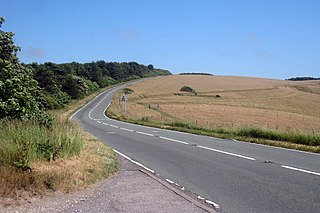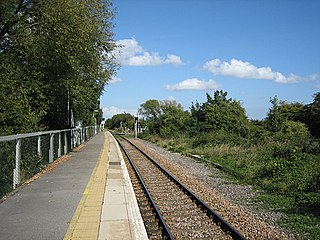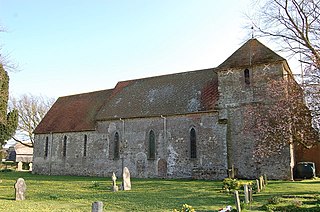
Terence Alan "Spike" Milligan was an Irish comedian, writer, musician, poet, playwright and actor. The son of an English mother and Irish father, he was born in British India, where he spent his childhood before relocating in 1931 to England, where he lived and worked for the majority of his life. Disliking his first name, he began to call himself "Spike" after hearing the band Spike Jones and his City Slickers on Radio Luxembourg.

Romney Marsh is a sparsely populated wetland area in the counties of Kent and East Sussex in the south-east of England. It covers about 100 square miles (260 km2). The Marsh has been in use for centuries, though its inhabitants commonly suffered from malaria until the 18th century. Due to its location, geography and isolation, it was important for smugglers between the 17th and 19th centuries. The area has long been used for sheep pasture: Romney Marsh sheep are considered one of the most successful and important sheep breeds. Featuring numerous waterways, and with some areas lying below sea level, the Marsh has over time sustained a gradual level of reclamation, both through natural causes and by human intervention.

The River Brede is an English river in East Sussex. It flows into the Rock Channel and then onto the River Rother at Rye, Sussex. It takes its name from the village of Brede, which lies between Hastings and Tenterden.

Rye is a town and civil parish in the Rother district of East Sussex, England, two miles from the sea at the confluence of three rivers: the Rother, the Tillingham and the Brede. An important member of the mediaeval Cinque Ports confederation, it was at the head of an embayment of the English Channel, and almost entirely surrounded by the sea.

Winchelsea is a town in the county of East Sussex, England, located between the High Weald and the Romney Marsh, approximately 2 miles (3.2 km) south west of Rye and 7 miles (11 km) north east of Hastings. The current town, which was founded in 1288, replaced an earlier town of the same name, known as Old Winchelsea, that was lost to coastal erosion in the late medieval period. Winchelsea is part of the civil parish of Icklesham.

Rother is a local government district in East Sussex, England. Its council is based in Bexhill-on-Sea. The district is named after the River Rother which flows within its boundaries.

The A259 is a road on the south coast of England passing through Hampshire, West Sussex, East Sussex, and Kent, and is the longest Zone 2 A road in Great Britain. The main part of the road connects Brighton, Peacehaven, Eastbourne, Hastings, Rye, and Folkestone.

Street signs can be stolen for use as decorations or to be sold as scrap metal. Although theft often seems arbitrary, signs with unusual or amusing names tend to be stolen more frequently. Sometimes considered to be a prank by the perpetrators, the theft is often costly and inconvenient for the municipality or agency that owns the sign. In the United States, each street sign generally costs between $100 and $500 to replace.

Monica Edwards was an English children's writer of the mid-twentieth century best known for her Romney Marsh and Punchbowl Farm series of children's novels.

The Marshlink line is a railway line in South East England. It runs from Ashford, Kent via Romney Marsh, Rye and the Ore Tunnel to Hastings where it connects to the East Coastway line towards Eastbourne and Brighton.

Winchelsea railway station is a railway station in East Sussex, England. It is about 0.62 miles (1 km) from Winchelsea and is actually in the neighbouring parish of Udimore. It is on the Marshlink line 9.3 miles (15 km) north east of Hastings, and train services are provided by Southern. The station originally had two platforms, but in 1979, the line was singled and only the up platform is now in use. The former down platform and station building are now converted to a private house.

Rustington is a village and civil parish in the Arun District of West Sussex. Rustington is approximately at the midpoint of the West Sussex coast and midway between Chichester and Brighton. The A259 runs along the north of Rustington, westward to Littlehampton, Bognor Regis and Chichester, and east to Worthing and Brighton. The area forms part of the Brighton and Hove built-up area.

Peasmarsh is a village and civil parish in the Rother district, in the county of East Sussex in England. It is located on the A268 road between Rye and Beckley, some 3 miles (4.8 km) north-west of Rye.

Udimore is a village and civil parish in the Rother district of East Sussex, England. It is located five miles (8 km) west of Rye on the B2089 road to Brede.

"Veronica" is a song by Elvis Costello, released in 1989 as the lead single from the album Spike. The song was co-written by Costello with Paul McCartney, and was co-produced with T-Bone Burnett and Kevin Killen, and features Paul McCartney on his iconic Höfner bass. In 2004, Entertainment Weekly voted it one of Costello's top ten greatest tunes.
The Hawkhurst Gang was a notorious criminal organisation involved in smuggling throughout south-east England from 1735 until 1749. One of the more infamous gangs of the early 18th century, they extended their influence from Hawkhurst, their base in Kent, along the South coast, where they successfully raided the Custom House, Poole. After they were defeated in a battle with the Goudhurst militia in 1747, two of their leaders, Arthur Gray and Thomas Kingsmill, were executed in 1748 and 1749, respectively.

The River Tillingham flows through the English county of East Sussex. It meets the River Brede and the eastern River Rother near the town of Rye. A navigable sluice controlled the entrance to the river between 1786 and 1928, when it was replaced by a vertical lifting gate which was not navigable. The river provided water power to operate the bellows of an iron works at Beckley Furnace, used to make cannons for the Royal Navy between 1578 and 1770, when it became uneconomic, and a water mill which replaced it, until that burnt down in 1909. The lower reaches supported a thriving shipbuilding industry from the early nineteenth century onwards, and although on a smaller scale, was still doing so in 2000.
Alex Preston is an English author and journalist.

Strand House was the Parish Workhouse of the Sussex town of Winchelsea known as the "Old Poor Houses". It was located on The Strand.



















